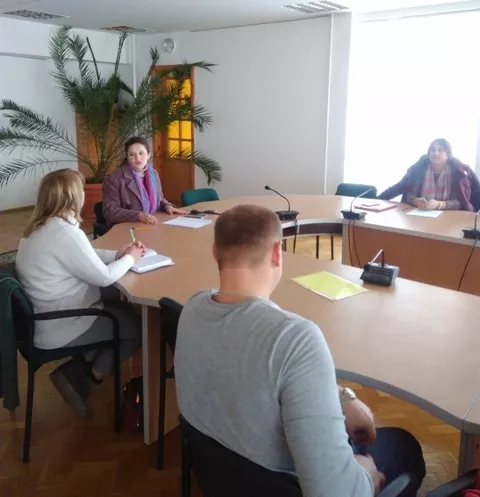On the 7th of March Lesya Ukrainka Eastern European National University was visited for the first time by the representative of the Swedish Institute, Viktor Hennius, program manager in the sphere of scholarships and support for learning the Swedish language.
“The Swedish Institute (SI) is a public agency that promotes interest and confidence in Sweden around the world. SI seeks to establish cooperation and lasting relations with other countries through strategic communication and exchange in the fields of culture, education, science and business.The support of Swedish language instruction at foreign universities also fits into this common agenda (www.si.se)”. Nowadays Swedish is taught in 229 universities all over the world, among these are higher educational institutions in Belarus, Poland and Russian Federation.
During his visit, Viktor had an appointment with rector Igor Kotsan, the dean of the Department of Foreign Philology Oksana Rogach, the head of the International Relations and Cooperation Office Marta Sydoruk, and the head of the Swedish Language Centre Alla Gnatiuk, who is also a contact person with the Swedish Institute in Lutsk. During this meeting the participants discussed perspective ways of cooperation. For example, the university administration proposed starting summer courses for learning Swedish in Lutsk and work on the list of research topics which would become the basis for the future common projects.
In Ukraine the Swedish language is taught in three universities: Kiev National Taras Shevchenko University, Ivan Franko National University of Lviv, and in Lesya Ukrainka Eastern European National University. In the structure of Lesya Ukrainka Eastern European National University functions the Centre of the Swedish Language and Culture, which provides Swedish classes for the students. The Centre also organizes meetings with the Swedish representatives, aims to develop mutual dialogue between the cultures, helps to strengthen educational, social and economic ties between Ukraine and Sweden.
The university organized a meeting for Viktor Hennius with the students who learn Swedish, where the representative of the Swedish Institute shared the information about scholarships for studying this language in Sweden. SI has already granted one student of the Department of Foreign Philology (speciality “Language and Literature (German)”) Viktoria Romaniuk with a scholarship at Ölands Folkhögskola and financed buying a computer for the Swedish classes.




Viktor Hennius focused his attention on Visby Program scholarships. This program gives the opportunity for the students with a good command of Swedish to win scholarship for studying different specialities in Swedish, even different from their initial education. This program is a part of Baltic Sea regional cooperation, which aims at creating scientific-research area. Applicants for Visby Program should be residents of Georgia, Moldova, Ukraine, Belarus and Russian Federation and have at least B1/B2 level in Swedish.
Special attention was also given to Swedish summer courses which take place in educational institutions of the boarding school type, that provide both studies and accommodation for adults.
The students were welcomed to visit the official webpage of the Swedish Institute www.si.se and apply for Visby Program scholarships (deadline – the 18th of May 2017).

Viktor Hennius draw student’s attention to the fact, that studying Swedish in the Swedish universities and communicating with the native speakers is the best way to improve their language skills. “I encourage You to learn Swedish, because it will help Your successful career in the future!” – added the lecturer.
After the students received all important information they started discussing upcoming questions with Viktor, who kindly gave answers to all of them.
Valentyna Kornijchuk
Translation: Alla Gnatiuk,
associate professor, the head of the Centre of the Swedish Language and Culture
When using this information reference to the source is obligatory
